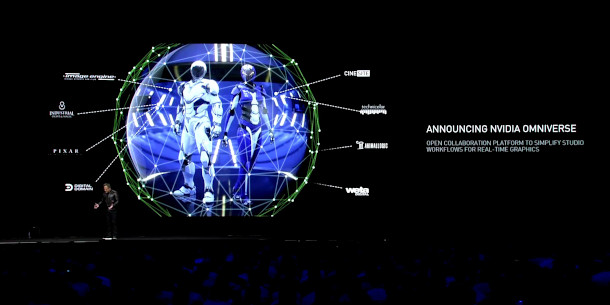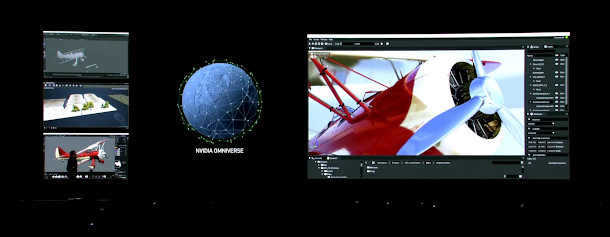Nvidia announces Omniverse open beta

Originally posted on 19 March 2019. Scroll down for news of the open beta.
Nvidia has unveiled Omniverse, a new “open collaboration” platform for 3D production pipelines, during the keynote at its own GPU Technology Conference.
The platform, which is built around Pixar’s USD format, will enable users to see changes made to common assets by other artists, working in other software, in real time.
Aiming to become ‘the Google Docs for 3D design’
In the keynote – we can’t embed the recording, but you can find it here: the relevant section starts at 00:41:20 – Nvidia CEO Jensen Huang describes Omniverse as “essentially the Google Docs for 3D design”.
The system enables users anywhere in the world to collaborate on a project via the internet.
It “works with all of the major 3D applications” – the live demo showed Maya, Substance Painter and Unreal Engine – registering changes made to a scene in any of the source apps.
The combined result is rendered in real time, with the rendered output streamed back to the collaborators.
As well as enabling simultaneous viewing of assets, Omniverse provides users with “frictionless asset management, layers and version control”.

Nvidia’s demo of Omniverse. Changes to common assets made by artists working in Maya, Unreal Engine and Substance Painter (left of screen) are combined and rendered in real time in the Omniverse viewer.
Based on USD, MDL, PhysX, Hydra – and RTX
The backbone of Omniverse is USD, Pixar’s Universal Scene Description format for complex visual effects scene data, which it open-sourced in 2016.
Changes to materials are transmitted via Nvidia’s own Material Definition Language (MDL), open-sourced last year, which seems to have been chosen over the – at present – less widely supported MaterialX.
Nvidia’s PhysX real-time physics system – also open-sourced last year – is used for dynamics, and USD’s Hydra framework as a rendering architecture.
Updated 5 October 2020: Omniverse also uses Flow, for gaseous fluid simulation like smoke and fire.
The one part of the process that isn’t built on an open standard seems to be rendering itself, which takes advantage of Nvidia’s RTX architecture, used in its new Quadro RTX, Titan RTX and GeForce RTX GPUs.
Nvidia describes Omniverse RTX as a “real-time ray traced [viewport] with native support for multi GPU”.
It isn’t clear from the presentation whether RTX is actually obligatory, or if there is some kind of fallback for other manufacturers’ hardware.
Updated 5 October 2020: Omniverse also supports renderers compatible with Pixar’s Hydra architecture, which currently includes Arnold, Houdini’s Karma renderer, and RenderMan.
In the keynote, Huang noted that it would be possible to install Omniverse on a local workstation running RTX hardware, in a data center, or on a cloud instance.
Since only the rendered frames need to be streamed back to the users, the ray traced output could be viewed even by artists working on low-end hardware like consumer laptops.

Updated 5 October 2020: Nvidia has announced that Omniverse will enter open beta later this fall.
The beta program will make Omnniverse available to the general public for the first time, following an 18-month “lighthouse program” of closed testing by large studios including Industrial Light & Magic.
The list of DCC applications and game engines with Omniverse Connect plugins has now grown to include 3ds Max, Houdini, Maya, Revit, Rhino, SketchUp, Unity and Unreal Engine.
Nvidia says that it is “in the early stages of working with Blender”, and that any application that supports USD is also “in the mix”.
The Omniverse website doesn’t currently include any pricing information, but Nvidia told journalists last week that individual users will be able to download it for free.
Availability and system requirements
Omniverse will enter open beta in fall 2020. It will be a free download for individual users. You will be able to register for beta access via the link below.
